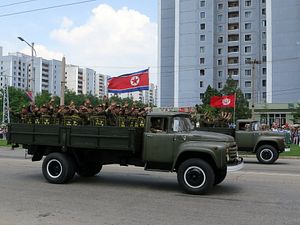Since Ban Ki-moon wrapped up a decade at the helm of the United Nations at the year’s end, the prospect of him becoming South Korea’s next president has divided opinion in his homeland. Despite a slide in his approval in recent weeks, the former UN secretary-general has consistently ranked as the public’s first or second choice to take over from impeached incumbent Park Geun-hye. In Realmeter’s most recent public survey, Ban garnered an approval rating of 21.8 percent, compared to 28.1 percent for his liberal rival Moon Jae-in.
There’s no such ambivalence to be heard from across the border: Pyongyang unambiguously loathes Ban.
In January alone, the Korean Central News Agency, the state propaganda service, has run a raft of articles describing trenchant criticism the former foreign minister has received at home.
In an article dated January 10, the KCNA reported that Ban had been exposed for “humiliating pro-Japanese behavior” in a commentary carried by the website Jaju Sibo, the successor to an online media outlet shut down under South Korea’s anti-communist national security laws.
The piece revealed him to be a “sycophantic politician,” the KCNA said, for bowing deeply in a meeting with the crown prince of Japan, whose colonial rule of the Korean Peninsula is bitterly remembered on both sides of the border.
Four days later, the KCNA published an article on Ban’s “crimes,” attacking him as a “faithful servant of the U.S.” who had “danced to the tunes” of conservative South Korean presidents who sanctioned and isolated North Korea. In a followup article, the KCNA charged that Ban had left an “indelible stain on (the) UN” for failing to quell civil war in an unnamed country, presumably Syria.
While recently aggravated about the possibility of a Ban presidency, Pyongyang has gunned for the career diplomat for years, lashing out when the UN has censured the country over its nuclear and missile tests, and human rights conditions.
“Pyongyang believes Ban, if elected, cannot change his position on North Korea’s Weapons of Mass Destruction program because Ban would not go against policies adopted by the institution he once represented,” Nam Chang-hee, an international relations professor at Inha University, told The Diplomat.
“Ban is also known to be poised to team up with ruling party defectors and anti-Moon opposition leaders, which implies that his North Korea policy will tilt toward hardliners,” he added.
While Ban has no party affiliation, he is widely expected to run under the banner of a center-right political grouping, likely made up of defectors from Park’s embattled conservative party. While he has yet to flesh out detailed policy plans, running as a conservative would likely see him take a harder line against North Korea than his main rival.
Moon, who served as chief of staff to a president that presided over a period of inter-Korean cooperation and dialogue known as “sunshine,” has floated a visit to the North and criticized sanctions against the regime.

































